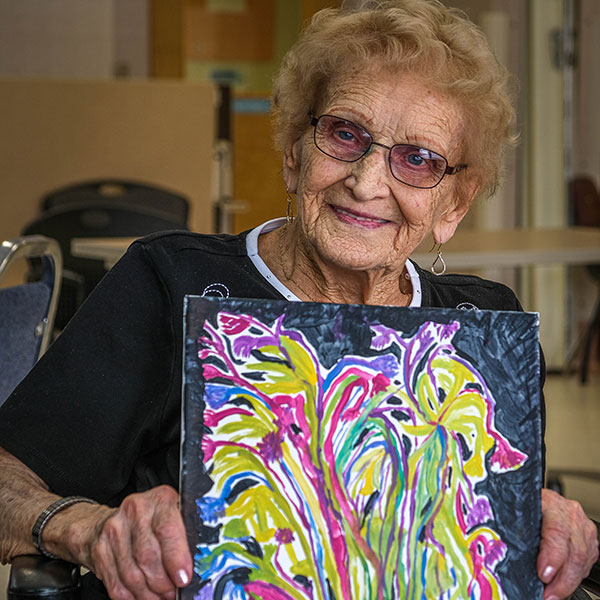Artists in Communities - Development provides small amounts of funding to organizations or professional artists to build relationships with potential partners, develop projects or residencies, and/or research community needs.
Artists in Communities - Projects allows eligible applicants to engage in the arts through performances, exhibitions, or workshops led by a professional artist(s) or arts professional and presented either as a series or as a single event, and/or to work with an artist in the research and development of an artistic residency.
Artists in Communities - Residencies supports community organizations to host a six- to twelve-month artist-in-residence project with a professional artist, working in any art form, that involves significant community engagement components. Participating artists take up residence in a community contribute to its cultural life and the community's continual engagement in the arts.

Artists in Communities is a SK Arts program supported by funding from Sask Lotteries through the partnership between SK Arts and SaskCulture Inc.
Deadlines
- Development: June 5 and December 5
- Projects: March 5 and November 5
- Residencies: March 5
Contact
Chancz Perry
(306) 550-1707 (Regina) or 800-667-7526 (Toll-Free)
Application and Information
Documents are subject to revision up to six weeks before the submission deadline.
Development
Projects
Residencies
Artists in Communities Tools
- Project/Residency Evaluation and Documentation
- Cultural Inventory/Cultural Needs Assessment
- Sample Partnership Contract
Eligibile Applicants
Partnerships that include organizations, community groups, businesses, schools, or other stakeholders and professional artists.
Please review the guidelines for more information on eligibility.
Maximum Funding
- Development: $1,000
- Projects: $10,000 (one artist); $20,000 (two artists)
- Residencies: $45,000
FAQs
I have never applied for a grant before. How do I begin?
Developing a project for the first time can be challenging. We recommend you contact a program consultant well in advance (six to eight weeks minimum) of the grant deadline date to discuss the application process and requirements. If you are in the early stages of developing a project, you may want to consider applying for a Development grant as a starting point. It is a small grant that is more responsive to emergent opportunities with simpler application requirements and quarterly deadlines. It allows communities to build relationships with potential artists, to present "experimental" introductory projects and to develop plans for longer term Projects and Residencies.
Do I have to have an artist partner before I apply for the grant?
If you are applying for a Development grant, you are not required to have an artist in place. For Projects and Residencies, there must be an artist partner in place to collaborate, plan, and execute the project.
Why do partnerships have to be in place prior to the application deadline date for Projects and Residencies?
Most effective projects come out of strong partnerships between the community organization or school and the professional artist(s), relationships that are genuine and where both partners plan and execute the project, respecting each other's roles.
Do we need to have additional community partners included in our project for our application to be successful?
While genuine community partnerships could raise the profile and long-term impact for the community, it may not be necessary for the project. It is important to form additional partnerships (potential partners) that come out of genuine relationships and are appropriate to the activity and size of the community.
When is it necessary to have additional community partners in place prior to the grant application deadline?
It is necessary to include an Elder or Knowledge Keeper partner for any application that involves any traditional Indigenous worldviews or art forms. A letter of support from the Elder or Knowledge Keeper partner is necessary to provide as part of the application.
Why does there have to be an exploration question?
The Artists in Communities program is about cultural growth and development. The exploration question serves as an "anchor" and allows processes to be responsive to the needs of the community. The question focusses the project and is intended to guide recipients' own planning, decision making, and changes in practice that results from the project. When both applicant partners create an exploration question, they are articulating what they hope to learn during the course of the grant program. That learning can then be applied in the community in its future planning.
Have the eligibility requirements changed?
Applicant eligibility has been expanded to include work places, businesses, and institutions. For example, Mosaic Mine at Estevan has hosted an artist residency, as has the Regina Qu'Appelle Health District. K-12 schools, school divisions, and band schools are also eligible to apply to the Artists in Communities project stream only for youth-directed activities (previously funded under the Arts After Hours stream). If you have a question about eligibility, you should call SK Arts and talk to a consultant.
Can you apply for a Residencies grant if you didn't receive a Projects grant?
We strongly encourage interested communities to apply for a Development grant or Projects grant as a precursor to applying to the Residencies grant. However, a community might undertake its own planning process, in which case the process and results should be described in the Residencies application.
Recent Recipients
Photo credit: Myrtle "Muzz" Armstrong with her artwork created through an artist residency with Shon Profit and the Art Gallery of Swift Current. Photo by Jim Etzkorn.

